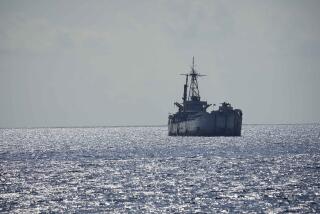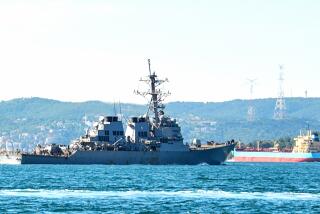FBI called in as U.S. tries to rescue captain held by Somali pirates
- Share via
NAIROBI, KENYA, AND WASHINGTON — As a freed U.S.-flagged freighter cruised out of Somalia’s crime-infested waters Thursday, a tense standoff continued for a second day between a U.S. warship and a tiny lifeboat, adrift with four stranded pirates and the American captain they were holding hostage.
A day after the American crew managed to turn the tables on pirates who had seized their cargo ship, the Danish-owned Maersk Alabama headed for safer waters with 18 armed guards from the U.S. destroyer Bainbridge on board.
Reports suggested that the cargo ship, which is carrying food and other humanitarian aid for African nations, was headed to its original destination of Mombasa, Kenya. However, the owner, Maersk Line Ltd., would not confirm where the ship and its crew would dock.
As FBI hostage negotiators joined efforts to free American Capt. Richard Phillips of Vermont, U.S. military officials expressed hope that the situation would end without the need to use force.
“We are trying to resolve this in a peaceful manner,” Pentagon spokesman Bryan Whitman said.
The Bainbridge, a guided-missile destroyer, is near the site of the hijacking, as are other Navy ships and planes, including P-3 surveillance planes and helicopters, Whitman said. “We do have U.S. naval assets in the vicinity,” he said. “The Navy is there to help resolve this situation.”
The Bainbridge has launched a drone aircraft called a ScanEagle, which is providing real-time video of the lifeboat. The military cannot see the captain or the pirates directly because the boat is covered. However, the ScanEagle can carry an infrared camera that might provide information about where the pirates and the captain are on the 24-foot craft.
The warship has contact by telephone and radio with the lifeboat, which is floating nearby after having run out of fuel, Maersk Line officials said. Phillips apparently has not been harmed, they said.
The Maersk Alabama was cruising about 250 miles off Somalia on Wednesday morning when it was besieged by at least two pirate skiffs. The attack was the first on a U.S.-registered ship off Africa in more than 200 years, though pirate attacks have plagued Somalia’s coast for years.
Shortly after pirates scaled the hull of the cargo ship, the 20-person crew retook control and the pirates fled in a lifeboat with the captain.
Information on exactly how the events unfolded remained sketchy, but new details emerged Thursday from sources close to the pirates.
In a telephone interview, a pirate based in the central Somali city of Harardhere said pirates who claimed to be holding Phillips were part of a group of seven that attacked the Maersk Alabama shortly after hijacking a German vessel in the same area. The twin attacks left them short-handed, so four remained on the U.S.-flagged vessel and the rest went with the German boat, he said.
As three pirates held Phillips at gunpoint on one part of the Maersk Alabama, a fourth guarded the crew with a machine gun, said the man, who did not want to be identified. His account could not be confirmed, but elements matched information the crew relayed to family members by telephone.
“One of the crew managed to get the pirate’s gun away from him and then they held that pirate captive,” the man said. The other three pirates fled in the lifeboat with Phillips.
The pirates offered to exchange the captain for the pirate and the machine gun, but U.S. crew members refused to give up the weapon, the man said.
Eventually the pirates agreed to swap the men only, but as the captain was attempting to climb back aboard, the captive pirate broke free and jumped into the water. The pirates reneged on the deal, prevented the captain from boarding the ship and picked up their colleague in the water, the man said.
Military analysts say the pirates have few options.
“At this point, it’s a waiting game and time is on the Navy’s side,” said retired U.S. Navy Cmdr. Kirk Lippold. “The pirates are in a lifeboat in the middle of the ocean. The only card they have to play is the captain.”
Lippold, now a senior military fellow at Military Families United, said the Navy probably has backup plans for a commando-style rescue attempt. But he doubted such an aggressive move would be tried because it would jeopardize Phillips’ life.
At best, he said, the pirates might be able to negotiate their escape to Somalia in exchange for releasing Phillips.
But the Pentagon cast doubt on its willingness to make deals, saying a key to discouraging future pirate attacks is holding criminals responsible. The U.S. has been handing over captured pirates to Kenyan authorities for trial.
“Should the U.S. come into custody of pirates, you can be assured a component of our strategy is to hold these individuals accountable for their crimes,” Whitman said.
Some comrades of the pirates in the Somali port city of Eyl said Thursday that they were mobilizing their own rescue operation.
“We need to send reinforcements to our colleagues to defend them,” said Abdiwahid Ilkacase, who said he commanded a network of pirates in Eyl. “They told us via satellite phone that a U.S. Navy ship was approaching and they seemed to be helpless.”
Residents in the town reported seeing pirates loading ships with heavy machine guns, rocket-propelled grenades and other supplies.
Lippold said any such attempts were doomed given the arrival of the 510-foot Bainbridge, which is heavily armed and carries a crew of about 300. “No one is coming to the pirates’ rescue, that’s for sure,” he said.
Though some hostage negotiations have gone for several months, experts said they doubted this standoff would last that long.
The encapsulated lifeboat has enough food and water for several days.
According to seafarers who have survived recent hijackings, pirates usually treat their hostages well. Killings and beatings are rare. Often pirates and hostages, sometimes trapped together for months, play cards, share cigarettes and even pray together as negotiations take place.
“If you can’t beat them, you might as well join them,” said Osman Mongore, 31, a Kenyan seafarer recalling his ordeal as a hostage.
The hours spent with pirates on the small lifeboat may work to Phillips’ advantage, experts said. “The longer they stay together, the more they might bond and form friendships,” said Andrew Mwangura, head of the East African Seafarers Assistance Program in Nairobi.
The U.S. crew’s counteroffensive is sparking an international debate about how to cope with Somalia’s piracy problem.
Some called the crew members heroes for defending themselves and said their actions would deter attacks. Others worried it might lead to more violence and deaths.
“We should not use the military at all,” Mwangura said. “These are already desperate people, and pushing them might lead them to resort to even more desperate tactics.”
The situation provoked expressions of concern from the White House, which convened an administration meeting on maritime safety. Secretary of State Hillary Rodham Clinton, Defense Secretary Robert M. Gates and Atty. Gen. Eric H. Holder Jr. expressed concern for Phillips’ safety.
“This is an old scourge,” Clinton said at a news conference with Gates. “One of the very first actions that was undertaken by our country in its very beginning was to go after pirates along the Barbary Coast. And it’s important that we come up with an international resolution of this.”
A get-tough approach to piracy has proved effective, experts said, both in Somalia and other parts of the world.
In 2006, pirate attacks off Somalia stopped during the six-month reign of a strict Islamist government, which threatened to behead pirates.
“China, in the 1990s, executed a number of people involved in piracy, including an entire boatload of pirates, and they haven’t had a piracy problem since,” said Justin Hastings, a professor at Georgia Tech who specializes in rogue states. “But obviously that might be morally problematic.”
He and others say Somalia’s rampant piracy is directly tied to the nation’s lack of a functioning government since 1991.
“You need to handle piracy at the source,” Hastings said.
--
edmund.sanders@ latimes.com
Special correspondents in Mogadishu, Somalia, and Dar es Salaam, Tanzania, contributed to this report.
More to Read
Sign up for Essential California
The most important California stories and recommendations in your inbox every morning.
You may occasionally receive promotional content from the Los Angeles Times.












